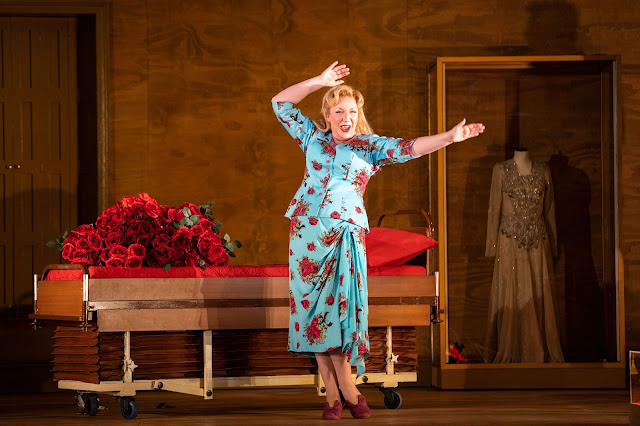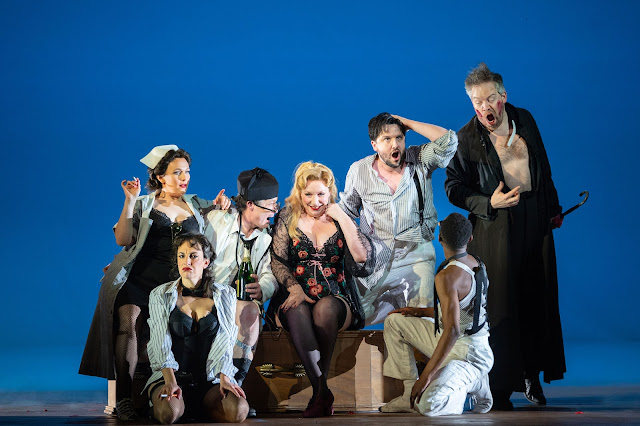Korngold: The Dead City (Die tote Stadt); Rolf Romei, Allison Oakes, Sarah Connolly, Audun Iversen, director: Annilese Miskimmon, conductor: Kyrill Karabits; English National Opera at London Coliseum
Reviewed 31 March 2023
Korngold's phantasmagorical opera for the first time at ENO in a highly theatrical production with strong performances
Korngold's Die tote Stadt has not appeared much in London, this production was English National Opera's first presentation of it, here called by its English translation, The Dead City. The UK premiere was, amazingly, in 1996 (a concert performance with Russell Keable conducting the Kensington Symphony Orchestra) whilst the Royal Opera's production in 2009 was the UK stage premiere.
At ENO, Annilese Miskimmon directed Korngold's Die tote Stadt, with set designs by Miriam Buether and costumes by Nicky Gillibrand. Rolf Romei was Paul, Allison Oakes was Marietta/voice of Marie, Sarah Connolly was Brigitta and Audun Iversen was Franz.
A work of music-theatre by a Viennese composer based on a German translation of a major work by a Belgian Symbolist. Fascinatingly this rather tortuous description can be applied both to Arnold Schoenberg's Pierrot Lunaire and Erich Korngold's Die tote Stadt. Schoenberg's Pierrot Lunaire was based on the poetic cycle Pierrot Lunaire by Belgian Symbolist poet Albert Giraud. Schoenberg set a total of 21 poems in German translations by Otto Erich Hartleben, whose translations were also set by Joseph Marx. The fascination for the work of the Symbolists can be understood in the wider context of Austrian expressionism, in music moving from the tonal experiments of Strauss to Schoenberg to Webern and Berg. And an artistic context this links to the Vienna Secession movement (1890s to 1914)
 |
| Korngold: The Dead City - Allison Oakes - English National Opera (Photo Helen Murray) |
Korngold's Die tote Stadt has similar origins; it was based on Bruges-la-morte, a short novel by the Belgian author Georges Rodenbach, published in 1892 and regarded as the archetypal Symbolist novel. Korngold and his father's libretto for the opera was based on a German translation by a friend of Korngold's father of Rodenbach's own play based on the book.
The difference between the two, however, is that of date. Pierrot Lunaire premiered in 1912, at the height of the Vienna Secession, whilst Die tote Stadt came after the horrors of the First World War. Neither work actually premiered in Vienna, one in Berlin, the other in Hamburg.
In a way, you feel that in Die tote Stadt, Korngold's first full-length opera (he was 23 at the time of its premiere) was harking back to the earlier era. So that musically, the work seems to relate to Richard Strauss' two early hits Salome (1905) and Elektra (1909), with the size of the orchestra, the lushness of the orchestration, the romantic language and the huge demands made on the lead singers/
Korngold was 17 when the First World War began, by which time he was already a significant composer. A child prodigy, writing his first orchestral score when he was 14, his Sinfonietta when he was 15 and his first two operas Der Ring des Polykrates and Violanta, in 1914. After Die tote Stadt, the sense of Korngold looking back continued as much of the 1920s were devoted to his exhumation and recreation of Johann Strauss operettas, so that A Night in Venice, Cagliostro in Vienna and Waltzes from Vienna are Korngold creations based on Strauss' music.
 |
| Korngold: The Dead City - Rolf Romei, Rhian Lois, William Morgan, Clare Presland, Hubert Francis, Innocent Masuku - English National Opera (Photo Helen Murray) |
For Korngold's fourth opera, Das Wunder der Heliane, he returned to the magic period of pre-War Vienna, choosing to base the opera on Der Heilige by Hans Kaltneker, an Austrian poet and playwright who was one of the main exponents of Austrian Expressionism and who died young in 1919. Kaltneker described Der Heilige as an anarchist-visionary mystery for music!
Die tote Stadt has always seemed a strange, hallucinogenic work, one whose exact dramaturgy remains open to discussion and exploration. Reading reviews of this production, it has been fascinating to see how many colleagues have a distinct, set view of the work and their reviews often had a tendency to point out the ways that Annilese Miskimmon's production departed from this 'perfect' view. But as we have seen Korngold was placing his opera not in the 1920s, but in the context of Symbolism and Expressionism, where nothing is fixed and everything is open to interpretation.
The Korngolds' libretto reduces the role played by Bruges in the plot, and this was further shaded away in Miskimmon's production as we stayed firmly in Paul's shrine to Marie, with events of act two and three taking place not in some theatrical Bruges, but spilling over into the shrine. And Buether's setting was not some period interior but a stylish modernist one. For the whole of act two, the border between the real and fantasy was blurred, which meant that the violence and ultimate murder were less shocking than usual. Miskimmon was more interested in what was going on in Paul's head rather than in schlocky violence. The Pierrot players in Act Two blurred in Paul's mind with the medical team who looked after Marie in her last illness, the bed in the shrine is even Marie's hospital bed.
 |
| Korngold: The Dead City - Sarah Connolly, Rolf Romei, Audun Iversen - English National Opera (Photo Helen Murray) |
The result was a production with real theatrical dazzle, the rear wall would disappear and processions walk past (Marie's funeral in Act Two, the Corpus Christi procession in Act Three). For Act Three, choirboys appeared through the fireplace below the memorial to Marie, the link between the red of the roses and of blood was everywhere. This meant that the Pierrot players' performance in Act Two was less a character moment and more a continuation of the intense drama.
Both the leading roles, Marietta/Marie and Paul are huge. Both in terms of length and also having to ride Korngold's huge orchestra. Economics and challenge are clearly factors in the work's relative neglect. Both Romei and Oakes were announced as recovering from colds, but this seemed to have little real impact on their performances.
Allison Oakes was in ravishing voice, she had the power to ride the orchestra yet her Marietta was also charming, skittish and seductive, whilst the power innate in her voice became impressive in Act Three when Marietta becomes increasingly jealous of Paul's obsession with his late wife. For Paul's scene with Marie, when we hear her voice, Oakes' voiced Marie in a way that sounded totally different and really fitted with actor Lauren Bridle's ethereal portrayal of Marie.
 |
| Korngold: The Dead City - Rhian Lois, Clare Presland, Hubert Francis, Allison Oakes, William Morgan, Innocent Masuku, Audun Iversen - English National Opera (Photo Helen Murray) |
Paul is simply a killer role, high, riding the orchestra and long, as if Korngold was continuing his emulation of Strauss' Elektra and Salome by creating a matching killer tenor role. Swiss tenor, Rolf Romei did not have the most grateful of voices, it is narrow focus, with bright laser gleam and at the top, rather high tension. But then, throughout the opera, Paul is a mass of tension and what conveyed the music was the way Romei acted, the way he brought out every nuance of Paul's intense journey, from cowering in the corner to strangling Marietta.
Audun Iversen was beautifully sober and sensible as Paul's friend, Franz, in Acts One and Three, but transformed into a wonderfully demented priest in Act Two. Just as Paul's fever dreams transformed the Pierrots into the medical team, Franz became the priest who gave Marie last rites. Iversen's account of the Pierrot song was very fine here indeed. Sarah Connolly was luxury casting as housekeeper Brigitta, investing the role with a greater significance than usual, and managing to come over as almost Mrs Danvers-like (as in Daphne du Maurier's Rebecca).
The smaller roles, the Pierrot players in Act Two were all well taken, giving us a riotous moment that became increasingly phantasmagorical, with Rhian Lois as Julietta, Clare Presland as Lucienne, Innocent Masuku as Gastone, William Morgan as Victorin and Hubert Francis as Count Albert.
The English text was 'based on a translation by Kelley Rourke', simple and direct, it perhaps lacked the poetry that might have been ideal. But, given the demanding nature of the vocal music, not surprisingly much of the text was occluded, though it was clear that the two non-English speakers in the cast, Romei and Iversen, were singing in more than creditable English.
In the pit (and spilling out into the stage boxes), Kirill Karabits and the orchestra brought out a gorgeous expressivity and lushness to the music. Throughout the sound of the orchestra was rich and sophisticated, luxurious even, really matching the feel of the drama.
The result was very much fin de siecle extravagance. I know that the opera can be seen as a way of dealing with the guilt from World War I, but frankly, for much of the time, it seemed much more of an escape into a fin de siecle world. Korngold seems to have successfully caught the mood, whereas his Italian contemporary Italo Montemezzi failed to do so. Montemezzi's La Nave (which premiered in 1918) treads a similar world of fin de siecle extravagance, huge orchestra, and demanding solo roles, yet was never popular.
 |
| Korngold: The Dead City - Rolf Romei - English National Opera (Photo Helen Murray) |
I have to confess, that I would love to hear Die tote Stadt receive the modern treatment, with someone producing a chamber version of the score so that it could be sung as more of an intimate chamber piece. It seems to be crying out for an imaginative treatment at Grimeborn.
Never miss out on future posts by following us
The blog is free, but I'd be delighted if you were to show your appreciation by buying me a coffee.
Elsewhere on this blog
- Focus on Manchester:
- A joy in telling stories in music: the Manchester Camerata, the Monastery & music - feature
- Successfully integrated into the same eco-system, The Stoller Hall and Chetham's School of Music - feature
- Let other pens dwell on misery and grief - a joyous ensemble performance of Jonathan Dove's Mansfield Park from RNCM Opera - opera review
- The latest in Manchester Camerata's Mozart, Made in Manchester series featured a lovely creative dialogue between Jean-Efflam Bavouzet, Gábor Takács-Nagy and the players - concert review
- Henning Kraggerud & RNCM Chamber Orchestra in RNCM's Original Voices Festival - concert review
- Every phrase has a story behind it: Gábor Takács-Nagy on conducting Mozart and more - interview
- Handel in Rome: Nardus Williams and the Dunedin Consort at Wigmore Hall - concert review
- After Byrd: HEXAD Collective launches its concert series exploring hidden music for voices - concert review
- The go-to place for information about opera performances across the globe: we chat to Operabase's new CEO, Ulrike Köstinger - interview
- A lockdown success story: St Mary's Perivale and its amazing programme of 120 recitals per year, viewed live and online - interview
- Late romanticism and youthful vitality: Cello Concertos by Enrique Casals & Édouard Lalo from Jan Vogler & Moritzburg Festival Orchestra - record review
- Friends are nothing, Family nothing, all the world is a wilderness: premiere recording of Jonathan Dove's In Exile - record review
- Home












No comments:
Post a Comment